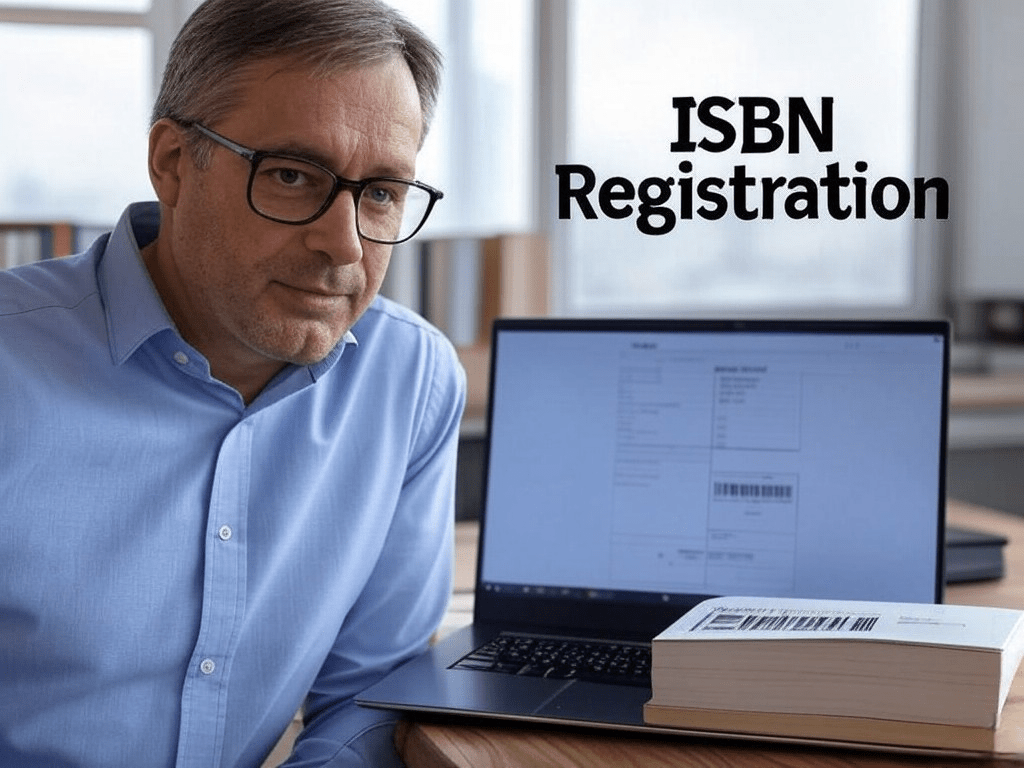What is ISBN Registration and Why is It Important?
ISBN registration is a crucial step for authors and publishers looking to distribute books through bookstores, libraries, and online platforms. ISBN, or International Standard Book Number, is a 13-digit unique identifier that helps in tracking and cataloging books. Without an ISBN, selling books through major retailers like Amazon or Barnes & Noble becomes nearly impossible. Additionally, ISBN registration plays a vital role in ensuring your book’s authenticity and professionalism, making it easier for readers, retailers, and libraries to recognize and locate your work. Whether you are a self-published author or working with a publishing house, obtaining an ISBN is an essential step toward making your book widely accessible.

Benefits of ISBN Registration
Global Book Recognition
An ISBN makes your book identifiable worldwide, setting it apart from millions of titles. It ensures easy tracking in bookstores, libraries, and online catalogs. This universal marker helps readers and institutions find your book effortlessly. Without an ISBN, bookstores may reject your book, and major databases may not list it, limiting sales and reach.
Easier Distribution
Retailers and libraries require ISBNs to track and order books efficiently. With an ISBN, your book joins major distribution networks, making it easy to stock and sell. It simplifies inventory management, allowing retailers to reorder and return books seamlessly. This increases your book’s chances of reaching larger audiences.
Enhanced Discoverability
ISBNs boost your book’s visibility on search engines and databases like Google Books and WorldCat. Books with ISBNs appear more frequently in search results, increasing audience reach and sales. Whether in print or digital format, an ISBN ensures correct indexing and better literary categorization.
Copyright Protection
An ISBN links your book to you, proving ownership and legitimacy. While it doesn’t grant copyright, it prevents misattribution and unauthorized use. Many legal and bibliographic systems track ISBNs to verify book ownership, adding a layer of protection to your work.
How to Register an ISBN for Your Book
Step 1: Determine If You Need an ISBN
If you’re self-publishing, an ISBN is highly recommended. Each format (hardcover, paperback, eBook) needs a unique ISBN for proper cataloging. Retailers and libraries use ISBNs to track and distribute books. However, audiobooks and unpublished manuscripts don’t require ISBNs, as they follow different cataloging rules. Assigning the right ISBN improves your book’s accessibility and sales potential.
Step 2: Choose Where to Buy an ISBN
To complete ISBN registration for books, you can purchase an ISBN from official agencies like:
- Bowker (U.S.) – myidentifiers.com
- Nielsen (UK, Ireland, Australia)
- International ISBN Agency (Other countries)
Each country has a designated ISBN authority. Buy directly from these sources to maintain full ownership. Avoid third-party sellers offering ISBNs tied to their platforms, as these may restrict your distribution options.
Step 3: Register Your ISBN
After purchasing, you must register your ISBN with metadata, including:
- Title and subtitle
- Author’s name
- Publisher details
- Book format (print, digital, etc.)
Accurate metadata improves discoverability in book databases and helps retailers and libraries order the correct edition. Errors in registration can affect sales and distribution.
Step 4: Add ISBN to Your Book
Once you receive your ISBN, it needs to be included in key locations within your book for proper identification. These include:
- The copyright page inside the book – This is the most common placement for an ISBN and is required for both print and digital formats.
- Back cover barcode for printed books – Converts ISBN into a scannable code, streamlining retail and library transactions.
By correctly placing your ISBN, you enhance the professional appearance of your book and make it easier for retailers to sell.
Free vs. Paid ISBN Registration
Key Differences:
| Feature | Free ISBN | Paid ISBN |
| Ownership | Platform-owned | Author-owned |
| ISBN Imprint | Platform’s name | Your publisher name |
| Usability | Limited to platform | Usable anywhere |
Authors often wonder about free ISBN registration for self-publishers. Some platforms like Amazon KDP offer free ISBNs, but these come with limitations. If you want full control over your book’s distribution, purchasing your own ISBN is the best option. With a free ISBN, your book will be tied to the platform’s imprint, restricting your ability to publish elsewhere. A paid ISBN, however, allows for wider distribution across multiple platforms and bookstores.
Common Mistakes to Avoid in ISBN Registration
- Using the same ISBN for different book formats – Each format needs a unique ISBN to ensure proper cataloging and sales tracking.
- Not registering ISBN metadata correctly – Incomplete or incorrect information can affect your book’s discoverability and credibility.
- Buying from unauthorized sources – Always purchase ISBNs from official ISBN agencies to ensure legitimacy and avoid restrictions on distribution.
Final Thoughts: Why ISBN Registration Matters for Authors
Completing ISBN registration for independent authors gives you better control over your book’s distribution, branding, and sales tracking. It enhances book credibility and ensures that your book can be easily found by readers and retailers. Whether you plan to sell through online platforms, bookstores, or libraries, an ISBN is an essential tool for professional publishing success.
Are you ready to take your book to the next level? Start your ISBN registration today and boost your book’s market potential!






